Must-Read: Nick Bunker: On Twitter: “Prime-age (25-54) EPOP up to 78.5%, Prime-age LFPR up as well to 81.6%…” https://twitter.com/nick_bunker/status/883302743401799680
Category: Equitablog
Should-Read: Brian Dow and Dean Baker: Obamacare: Big Problem in Republican States
Should-Read: Brian Dow and Dean Baker: Obamacare: Big Problem in Republican States: “The lack of competition in the exchanges is a serious problem… http://cepr.net/blogs/cepr-blog/the-collapse-of-obamacare-big-problem-in-republican-states
…However, there is an important part of the story that Trump and other Republicans forget to mention. The lack of competition in the exchanges is overwhelmingly a problem for people living in states controlled by Republican governors…. As can be seen over 40 million of the people in counties with only one insurer in the exchanges live in states with Republican governors…. While North Carolina does now have a Democratic governor, he just took office at the start of the year…. This means that there are almost 20 times as many people with no choice of insurers in the exchange in states with Republican governors as in states other than North Carolina that have Democratic governors…. 20.7 percent of the people living in states with Republican governors have only one insurer in the exchange. By comparison… 1.8 percent of people living in states other than North Carolina controlled by Democratic governors only have one insurer in their exchange…
Equitable Growth’s Jobs Day Graphs: June 2017 Report Edition
1.
The prime-age employment rate rose by 0.1 percentage points to 78.5 percent in June. Employment is still recovering and looks to have room to run.
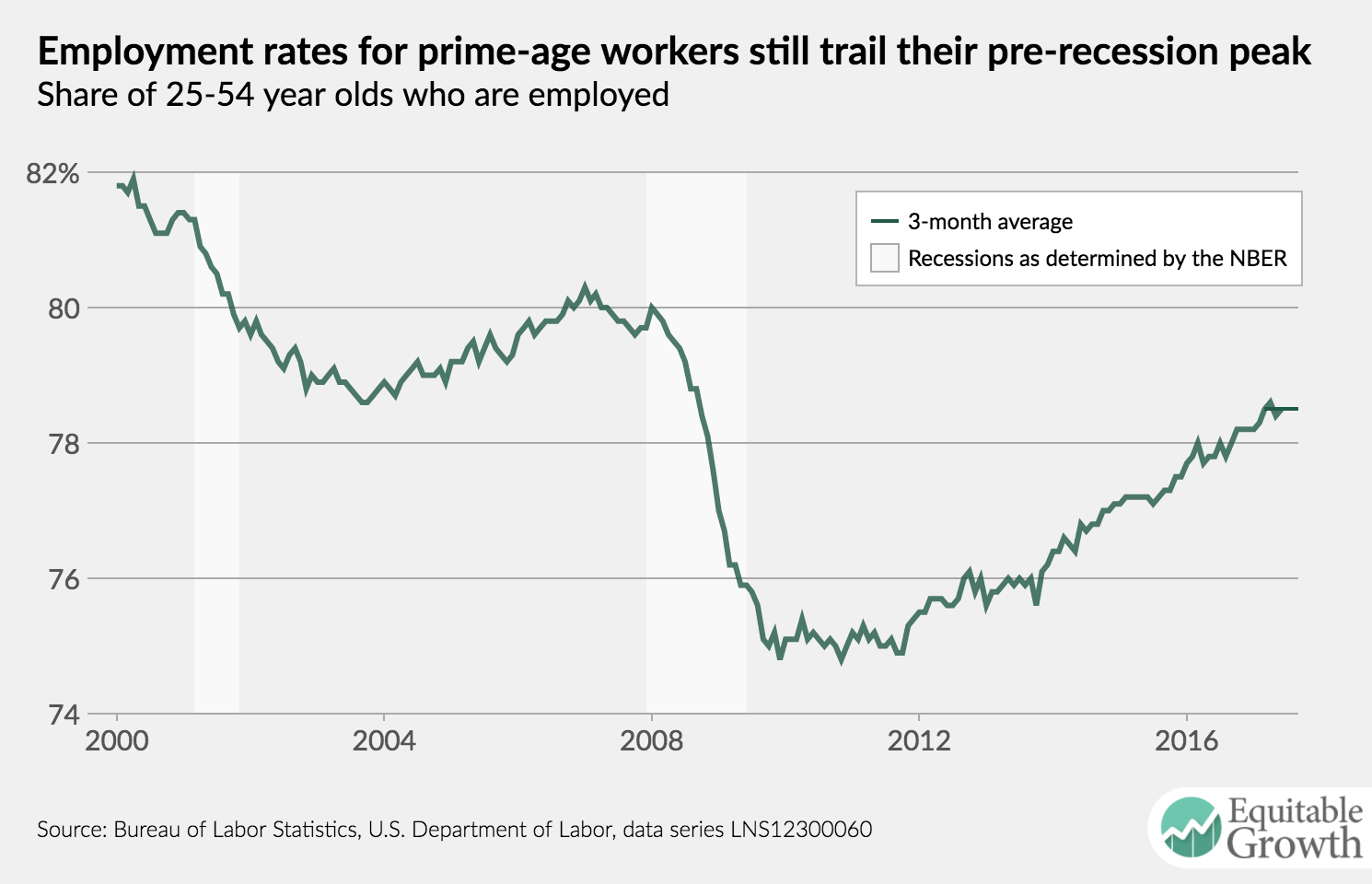
a
2.
The African-American unemployment rate continues to be significantly elevated, but saw another 0.4 percentage point drop in June as the white unemployment rate rose by 0.1 points.
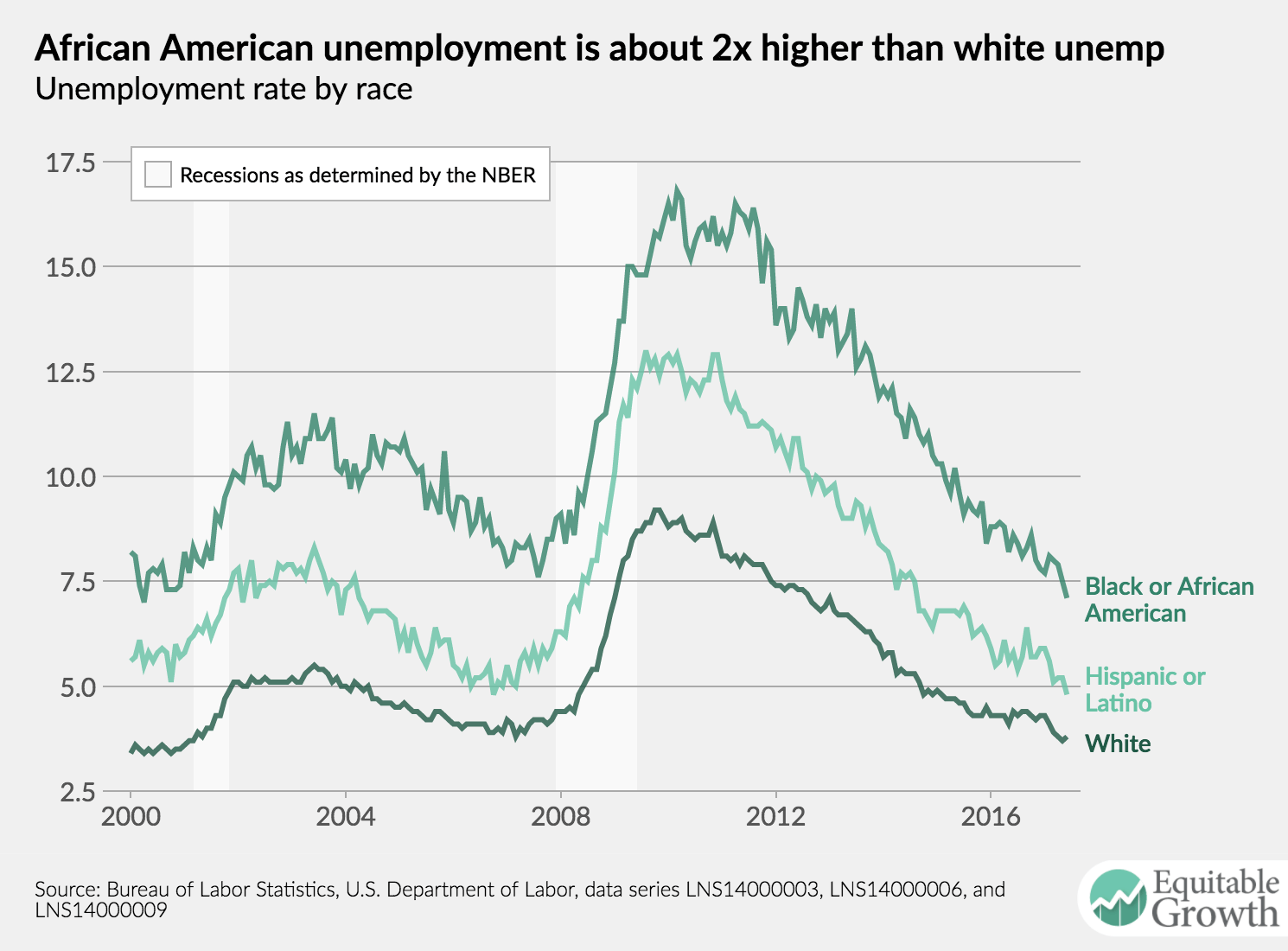
a
3.
Unemployment spells of 15 weeks or longer dropped significantly in June, with almost all of the decline in unemployment of 15 to 26 weeks long (13.8% from 16.7%).
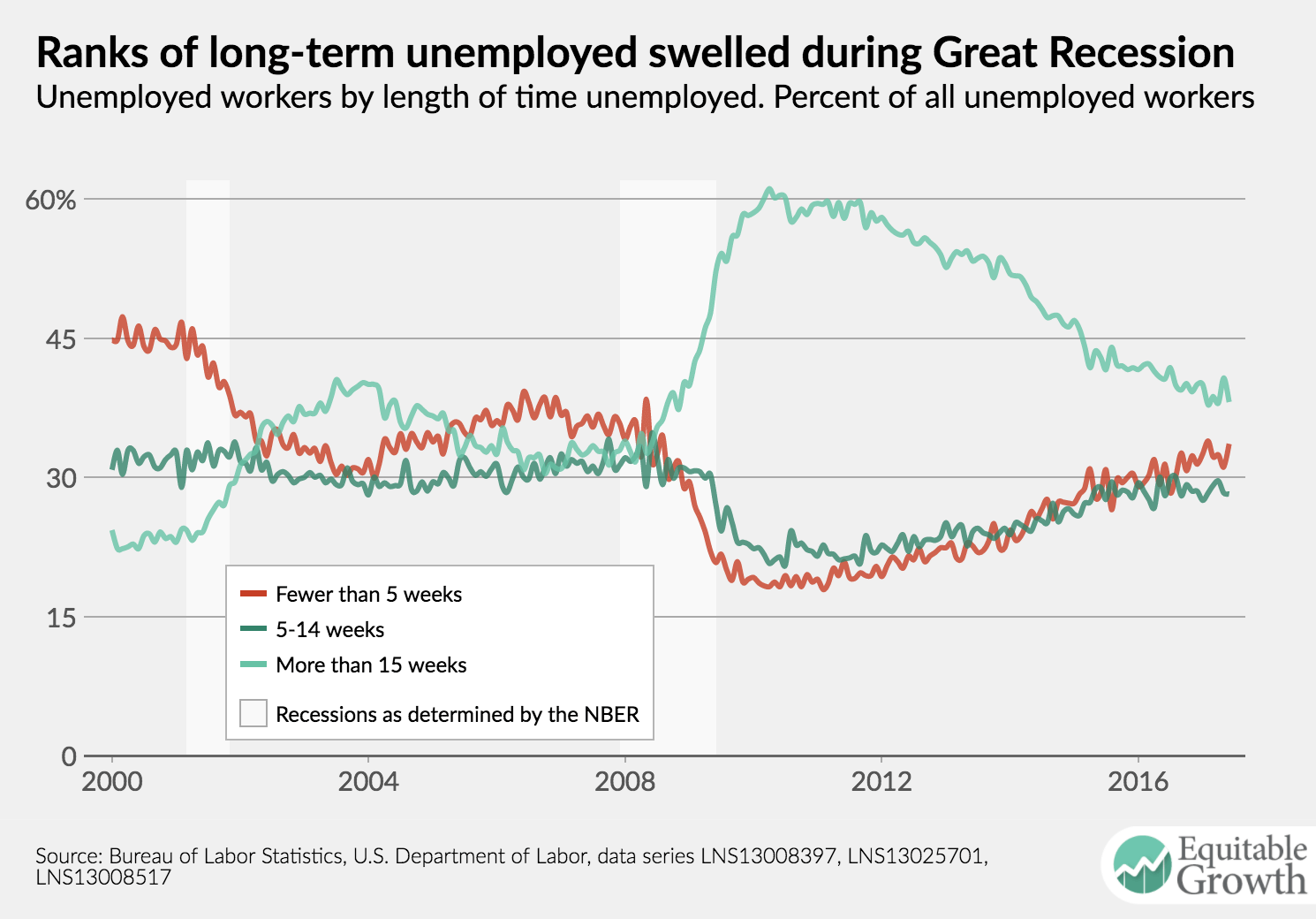
a
4.
Nominal wage growth, measured by average hourly earnings for production workers, is still muted. It grew 2.3 percent year-over-year in June.
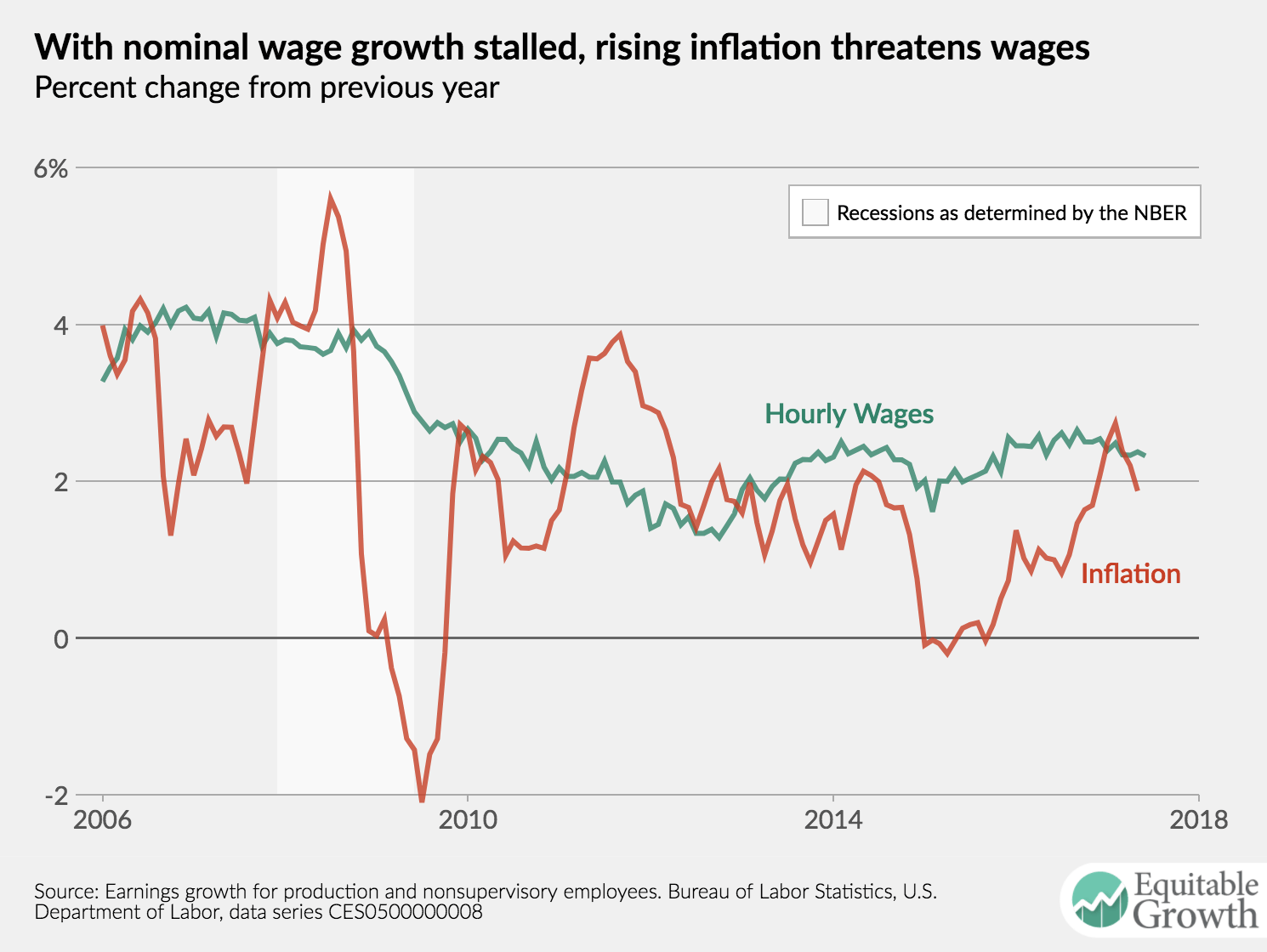
a
5.
Retail employment saw gains in June, growing by 8,000. Health care continues to lead the pack, adding 37,000 jobs.
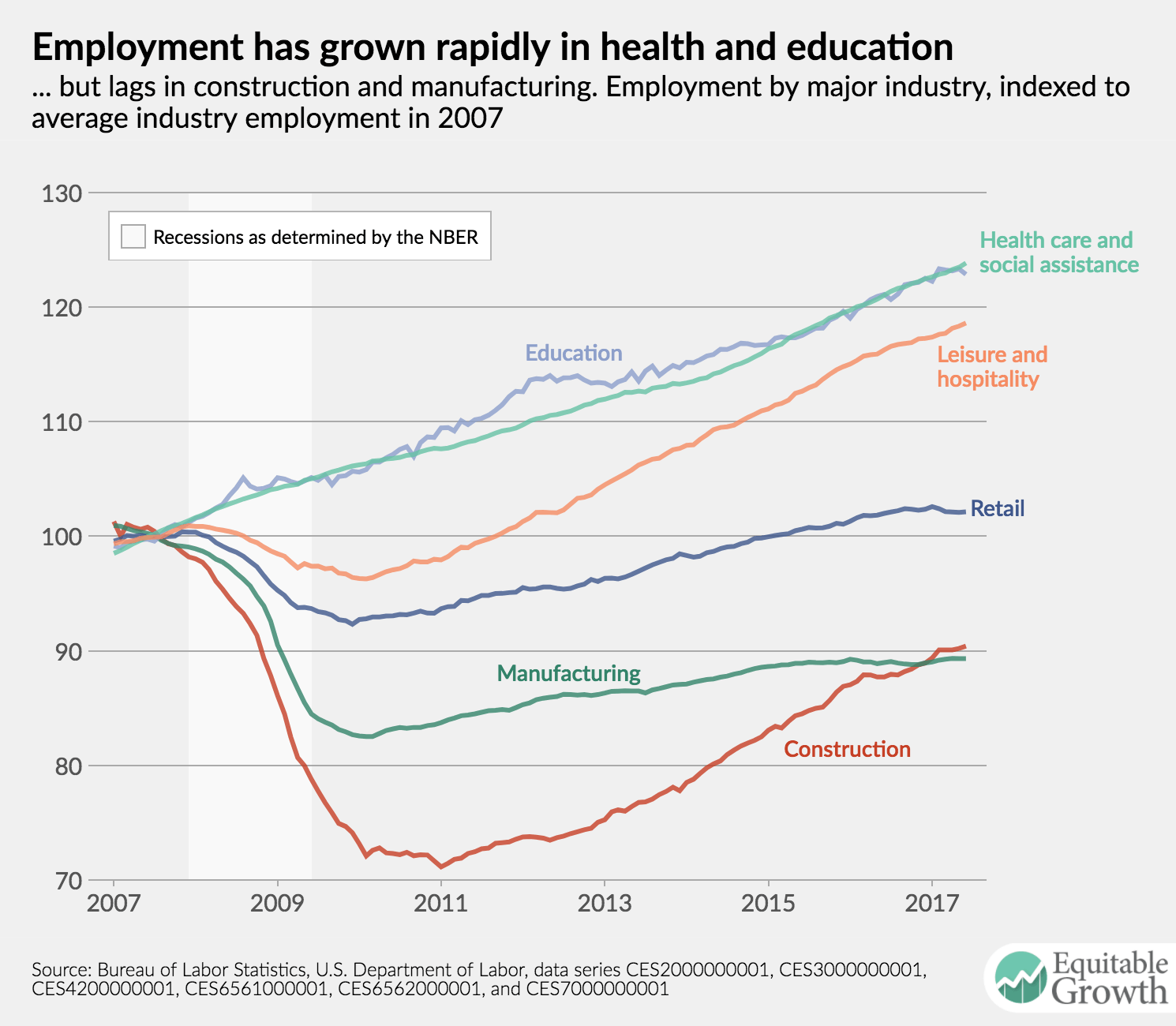
a
Must-Read: Roy Elis, Stephen Haber, and Jordan Horrillo: Climate, Geography, and the Evolution of Economic and Political Systems
Must-Read: Roy Elis, Stephen Haber, and Jordan Horrillo: Climate, Geography, and the Evolution of Economic and Political Systems https://economics.barnard.edu/sites/default/files/elis_haber_and_horrillo_march_25_2017.pdf: “The agricultural economies of the hinterlands of the largest city in every country or proto-country circa 1750 predict roughly half of the variance in countries’ per capita GDP today and one-fifth of the variance in countries’ levels of democracy today….
…These facts are: the potential production of storable food kilocalories, the loss of work effort from endemic malaria, and the frequency of droughts severe enough to wipe out all storable food kilocalorie production…. For example, conditional on the historical malarial environment (which reduced potential work effort), and the historical drought proneness of a hinterland, a one standard deviation increase in the ability to generate storable food kilocalories produces roughly half a standard deviation increase in the level of democracy today. These results are robust to the addition of possible confounders such as colonial heritage, participation in the slave trade, or having a petroleum-intensive economy….
Potential production of storable food… endemic malaria, and the frequency of droughts… are also good predictors of the level of urbanization of societies circa 1800 and their level and distribution of human capital circa 1820, 1870, and 1950….
Should-Read: Diane Coyle: Economics in Transition: Adaptive Markets
Should-Read: Diane Coyle: Economics in Transition: Adaptive Markets: “Adaptive Markets, by MIT’s Andrew Lo, gives a superb and fascinating account of thinking on the frontier… https://www.project-syndicate.org/onpoint/economics-in-transition-by-diane-coyle-2017-06
…the kind of approach rooted in biology and psychology that Richard Bookstaber… advocates in the final part of The End of Theory….One of the most effective points made by advocates of Fama’s now-notorious Efficient Markets Hypothesis is that it is in fact difficult to beat the market; profit-making opportunities are swiftly arbitraged away. And, indeed, Lo argues that when financial markets are stable enough for long enough, the rationality-based model is appropriate. But the moment there is any instability, human fear, greed, culture, behavioral norms, storytelling, and imagination kick in. The environment determines the way market participants behave….
The test of the adaptive markets approach, though, must be how it helps to predict, avert, or respond to financial crises…. Financial markets need to be viewed–by investors and regulators alike–as an ecosystem. The lesson from biology is that systems require feedback loops in order to regulate themselves…. Lo urges regulators to think of these feedback loops–literally–systematically, and proposes using network theory to map the whole of the financial regulatory system. Not surprisingly, the outcome of this exercise for the United States is not reassuring…
Should-Read: Martin Sandbu: Central bank rush to ‘normalise’ monetary policy is ill-advised
Should-Read: Martin Sandbu: Central bank rush to ‘normalise’ monetary policy is ill-advised: “An understanding to “normalise” together, if one exists, would not be a suicide pact… https://www.ft.com/content/3ad81df6-6161-11e7-8814-0ac7eb84e5f1
…unlike the universal and premature switch to severe fiscal consolidation in 2010. But it would be one of self-mutilation. As Gavyn Davies explains in his latest column, the global recovery is showing up in economic growth but not in accelerating inflation. Many had expected that… inflation would pick…. But there is no sign of this…. This looks like a positive global supply shock that would push activity and inflation in the opposite direction, as productive capacity expands more than anticipated. If that is indeed the cause of the present “lowflation” regime, monetary policy ought “to shift policy in the same direction as the signal from inflation, in this case towards less tightening”. That is not happening…. We might all be better served by ditching the term normalisation altogether. It implies, incorrectly, that there is something wrong or excessive about the current monetary policy stance. If today’s policy conditions are abnormal, it is an abnormality that policymakers should embrace rather than avoid…
Should-Read: David Cashin, Jamie Lenney, Byron Lutz, and William Peterman: Fiscal Policy and Aggregate Demand in the U.S. Before, During and Following the Great Recession
Should-Read: David Cashin, Jamie Lenney, Byron Lutz, and William Peterman: Fiscal Policy and Aggregate Demand in the U.S. Before, During and Following the Great Recession: “We examine the effect of federal and subnational fiscal policy on aggregate demand in the U.S. by introducing the fiscal effect (FE) measure… https://www.federalreserve.gov/econres/feds/files/2017061pap.pdf
…FE can be decomposed into three components. Discretionary FE quantifies the effect of discretionary or legislated policy changes on aggregate demand. Cyclical FE captures the effect of the automatic stabilizers—changes in government taxes and spending arising from the business cycle. Residual FE measures the effect of all changes in government revenues and outlays which cannot be categorized as either discretionary or cyclical; for example, it captures the effect of the secular increase in entitlement program spending due to the aging of the population.
We use FE to examine the contribution of fiscal policy to growth in real GDP over the course of the Great Recession and current expansion. We compare this contribution to the contributions to growth in aggregate demand made by fiscal policy over past business cycles. In doing so, we highlight that the relatively strong support of government policy to GDP growth during the Great Recession was followed by a historically weak contribution over the course of the current expansion…
Must- and Should-Reads: July 6, 2017
- Josh Barro: GOP healthcare bill will poll badly no matter what: “Now I have to call those providers’ offices and get duplicate receipts and upload them and allow seven to 10 days for processing… http://www.businessinsider.com/gop-healthcare-bill-polls-bad-changes-2017-6
- Patrick Iber: On Twitter: “.@davidsess has a phenomenal review/essay of @dandrezner’s The Ideas Industry in the latest @NewRepublic… https://twitter.com/PatrickIber/status/874438806287659008
- Paul Krugman (2015): When Values Disappear: “Back in the 60s and 70s… there was much talk about the disintegration of… African-American values… https://krugman.blogs.nytimes.com/2015/03/11/when-values-disappear/
- James Hamilton: Are we in a new inflation regime?: “I’m not saying the Phillips Curve has no basis in facts… http://econbrowser.com/archives/2017/07/are-we-in-a-new-inflation-regime
- Laura Tyson and Lenny Mendonca: Kansas or California?: “Donald Trump and congressional Republicans[‘]… claims are baseless… https://www.project-syndicate.org/commentary/increase-earned-income-credit-and-minimum-wage-by-laura-tyson-and-lenny-mendonca-2017-07
- Dylan Matthews: What’s the point of an anti-immigrant left?: “Beinart’s policy argument is… mistaken… https://www.vox.com/2017/7/2/15847840/beinart-atlantic-left-immigration
- Paul Krugman: Oh! What a Lovely Trade War: “I’m not making a purist case for free trade here… https://www.nytimes.com/2017/07/03/opinion/trump-trade-war.html?_r=0
Interesting Reads:
- Dan Diamond: On Twitter: Many GOP senators, home for recess, woke up today to front-page stories about the local damage their health bill would cause… https://twitter.com/ddiamond/status/881613460014063623
- David Weigel et al.: At parades and protests, GOP lawmakers get earful about health care http://www.thegazette.com/at-parades-and-protests-gop-lawmakers-get-earful-about-health-care-20170705
- Kevin Erdman (2014): Stock/Bond Asset Allocation: “The past century’s experience gives absolutely no reason to allocate to bonds on a 20 year time scale, and scant reason to do it even at a 10 year horizon…” http://idiosyncraticwhisk.blogspot.ca/2014/02/stockbond-asset-allocation.html | Stock/Bond Asset Allocation-Don’t bother with duration risk: “I am not claiming simply that the extra gains from stocks over long periods may not be worth the extra risk they entail. I am saying that owning any bonds for longer periods than this is suboptimal. There is no reasonable excuse for owning them. For a 20 year portfolio, it’s like selling call options against a portion of your stock portfolio, and paying the option buyer a 70% negative premium…” http://idiosyncraticwhisk.blogspot.com/2014/02/stockbond-asset-allocation-dont-bother.html | Idiosyncratic Whisk: Stock/Bond Asset Allocation-Short Duration with a mortgage! (Oh, you already are?) http://idiosyncraticwhisk.blogspot.com/2014/03/stockbond-asset-allocation-part-3-short.html: “I have always seen the tendency of American households to concentrate their savings in a single, highly leveraged piece of real estate to be dangerous and inappropriate. But, seen in this light, maybe we have stumbled into an optimal set of conventional investments. If American households should be holding more low-risk hedges, more stocks, and be short bonds in their portfolios, highly leveraged homes are providing exactly that set of exposures…”
- Hatty Collier: Man behind controversial £350m-a-week for the NHS Brexit bus slogan admits leaving EU could be ‘an error’: “Dominic Cummings, the Vote Leave campaign director, described the EU referendum as a “dumb idea” in a series of tweets, and said other options should have been tried out first before the vote was called…” http://www.standard.co.uk/news/politics/man-behind-350m-a-week-brexit-bus-lie-admits-leaving-eu-could-be-an-error-a3579676.html
- Rohinton P. Medhora: The Future of Trade: “The past year’s populist resurgence has brought to the fore ongoing debates about trade and underscored public concerns about internationalism. Can the mechanisms of globalization that shaped the twentieth-century world economy be salvaged to continue delivering prosperity in the coming decades?…” https://www.project-syndicate.org/onpoint/the-future-of-trade-by-rohinton-p–medhora-2017-06
- David Anderson: Risk adjustment notes https://www.balloon-juice.com/2017/07/03/risk-adjustment-notes/
- Christina Powell: Senate health bill means choosing between ‘children, seniors, the disabled,’ http://abcnews.go.com/Politics/senate-health-bill-force-choosing-children-seniors-disabled/story?id=48392178
- Public Spheres for the Trump Age: Fresh at Project Syndicate http://www.bradford-delong.com/2017/07/public-spheres-for-the-trump-age-fresh-at-project-syndicate.html
- Live from America’s Better Self: Noah Smith: ON TWITTER: “1/HAPPY BIRTHDAY, AMERICA! In honor of the Fourth of July, here is a thread full of Daniel Inouye quotes…” http://www.bradford-delong.com/2017/07/live-from-americas-better-self-noah-smith-on-twitter-1happy-birthday-america-in-honor-of-the-fourth-of-july-here.html
Should-Read: Josh Barro: GOP healthcare bill will poll badly no matter what
Should-Read: Josh Barro: GOP healthcare bill will poll badly no matter what: “Now I have to call those providers’ offices and get duplicate receipts and upload them and allow seven to 10 days for processing… http://www.businessinsider.com/gop-healthcare-bill-polls-bad-changes-2017-6
…Until I do that, I have been cut off from access to the money in the account—my own money—that got in the account only because Congress chose to offer a tax preference that I could get only by using such an account.
Who wants to deal with this crap?
Nobody wants to deal with this crap, that’s who
Officially, the Republican healthcare vision involves even more of this—tracking your healthcare funds in a special account, paying at the point of delivery for care you receive, and shopping around for your surgery as if it’s a dream vacation. For the past seven years, Republicans haven’t been saying the problem with Obamacare was too little out-of-pocket spending. They’ve been saying the opposite… that Obamacare plans have deductibles… coinsurance payments are too high. That insurance under Obamacare isn’t good insurance because people have to pay so much after they’ve already paid premiums. This was an effective political argument because this is, in fact, one of the things people hate about Obamacare….
The problem is, fixing that problem would have cost money. So Republicans lied. They said they would give people insurance with lower deductibles. But then they wrote a law that would result in eye-wateringly high deductibles—for example, a deductible of about $6,000 for somebody with a family income of $16,000. Of course that’s unpopular. (News flash: Someone with an income of $16,000 doesn’t have $6,000 to pay toward a deductible.) But it’s what you have to do if you want the bill to cut a trillion dollars in government spending on healthcare without actually doing anything to make healthcare cheaper. But then, this bill was never about improving healthcare or making healthcare consumers happy. It was about repealing the tax increases that Obamacare imposed. Both the House and Senate bills would indeed do that. And as long as that’s the core goal, there’s no way to restructure the law to make people not hate it…
Should-Read: Dan Diamond On Twitter: Many GOP senators, home for recess…
Should-Read: Dan Diamond: On Twitter: Many GOP senators, home for recess, woke up today to front-page stories about the local damage their health bill would cause… https://twitter.com/ddiamond/status/881613460014063623
…Sen. @BillCassidy (R-La.) and the New Orleans Advocate. Sen. @TedCruz (R-Texas) and the Houston Chronicle. Sen. @JerryMoran and the Lawrence Journal-World. @SenCapito (R-W.V.) and the Dominion Post. Sen. @LisaMurkowski (R-Alaska) and the Alaska Dispatch News. Sen. @RandPaul and @SenateMajLdr (R-Ky.) and the Lexington Herald-Leader. There’s been a lot of focus on what the media is, and isn’t, covering. Credit to local press for using platform to spotlight real issues…
